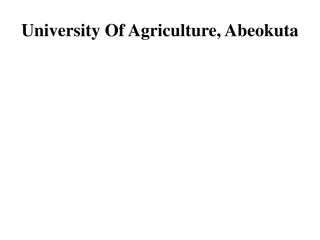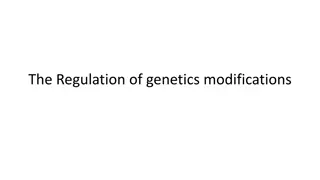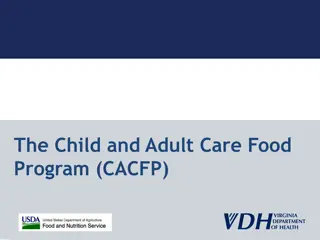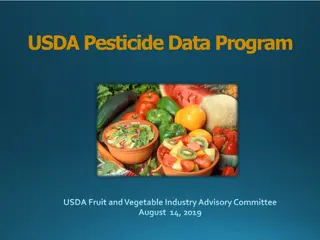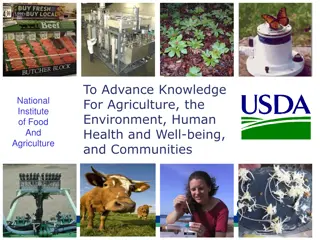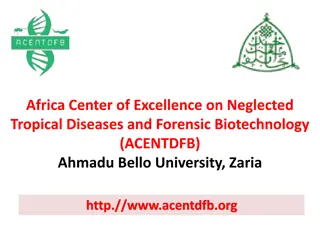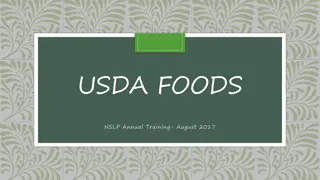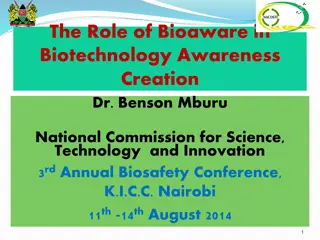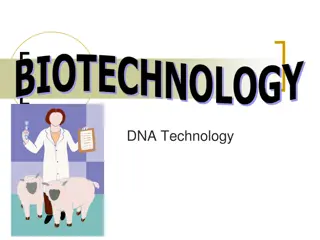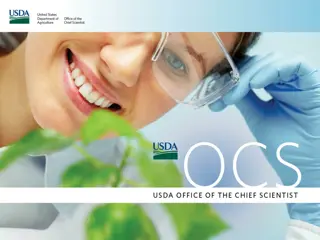Ongoing USDA Programs and Biotechnology Research Overview
This overview delves into ongoing USDA programs such as the Biotechnology Risk Assessment Grants (BRAG) Program, which supports biotechnology research. The program covers risk assessment, management, pollen flow research, gene transfer control methods, and more. Additionally, voluntary market facilitation services are highlighted to aid in marketing conventional and genetically engineered food products in domestic and international markets. The presentation also sheds light on aspects not covered by the programs.
Download Presentation

Please find below an Image/Link to download the presentation.
The content on the website is provided AS IS for your information and personal use only. It may not be sold, licensed, or shared on other websites without obtaining consent from the author.If you encounter any issues during the download, it is possible that the publisher has removed the file from their server.
You are allowed to download the files provided on this website for personal or commercial use, subject to the condition that they are used lawfully. All files are the property of their respective owners.
The content on the website is provided AS IS for your information and personal use only. It may not be sold, licensed, or shared on other websites without obtaining consent from the author.
E N D
Presentation Transcript
Michael Schechtman Executive Secretary, AC21
What will and will not be covered Programmatic activities within and outside government Not a comprehensive survey Does not cover the vital role of farmer-to-farmer and other informal communications Only covers activities relating to products intended to be in commerce, i.e., not products still in R & D phase, for which there are various regulatory compliance programs
Caveats Descriptions will be brief Others in this room may be more knowledgeable on some of these activities Additional presentations on individual topics may be provided at a subsequent meeting Some relevant topics relating to organic and other identity-preserved production practices will be covered in the next talk.
Ongoing USDA Programs Biotechnology Risk Assessment Grants (BRAG) Program Supported by a 2% withholding on expenditures for biotechnology research within USDA . Jointly administered by the National Institute for Food and Agriculture (NIFA) and the Agricultural Research Service (ARS). Program in existence since 1992. Over the past 3 years, an average of 15 proposal funded per year.
Ongoing USDA Programs, continued BRAG program, continued Supports both risk assessment and risk management research, including research on the biology of pollen flow in different species and methods to control gene transfer or its consequences and a variety of other topics Does not support research on food safety, human or animal health, social or economic issues, methods for seed storage, clinical trials, commercial product development, product marketing strategies, or marketing or trade issues.
Ongoing USDA Programs, continued Voluntary market facilitation services Developed by the Agricultural Marketing Service (AMS) and the Grain Inspection, Packers, and Stockyards Administration (GIPSA) To facilitate the marketing of conventional and genetically engineered foods, fibers, grains, and oilseeds in both domestic and international markets. GIPSA for the bulk grain and oilseed markets AMS for food commodities such as fruits and vegetables, as well as for fiber commodities.
Ongoing USDA Programs, continued Voluntary market facilitation services, continued Evaluation of performance of commercially available protein detection kits GIPSA and AMS Proficiency program to evaluate the performance of laboratories conducting DNA-based tests to detect genetically engineered materials GIPSA Identity Preservation/Process Verification for third-party audit and certification of use of written quality practices and/or production processes by producers who differentiate their commodities using identity preservation, testing, and product branding GIPSA and AMS Fee-based DNA and protein testing services for food and fiber products--AMS
USDA Programs announced in 2011 Reviving the National Genetic Resources Advisory Council (NGRAC) The purpose of the Council is to formulate recommendations on actions and policies for the collection, maintenance, and utilization of genetic resources by ARS; make recommendations for coordination of genetic resources plans of domestic and international organizations; and to advise the Secretary of Agriculture and the National Genetic Resources Program Director of new and innovative approaches to genetic resources conservation.
USDA Programs announced in 2011, continued NGRAC, continued Advice to USDA to ensure that the National Genetic Resources Program serves the needs of all farmers for high quality seed (both GE and non-GE) Advice on Developing a broad strategy for maintaining plant biodiversity available to farmers Strengthening public sector breeding capacities Working with the private sector to ensure an adequate diversity of high quality seeds for all U.S. farmers. Cross-talk between the NGRAC and the AC21
USDA Programs announced in 2011, continued Workshop on the Science of Gene Flow in Agriculture and its Role in Coexistence To be held September 7-8 at USDA Experts from academia and industry will discuss biology related to gene flow and persistence, as well as current and upcoming technologies to control gene flow Current and future strategies, both transgenic and non- transgenic, to minimize gene flow and maintain seed purity in all sectors of the agricultural community Participants from the seed and plant production industries, the plant sciences community, and government
USDA programs announced in 2011, continued Clarified National Organic Program policy on GMOs The National Organic Program (NOP) regulations prohibit the use of GMOs as excluded methods. NOP is process based. The presence of a detectable residue from a genetically modified organism alone does not necessarily constitute a violation of this regulation. NOP producers must take reasonable steps to avoid contact with the products of excluded methods as detailed in their approved organic system plan. Organic certifying agents work with organic producers to identify the source of the inadvertent GMO material when found and to implement improvements to prevent contact with GMOs in the future.
USDA 2011 Programs related to alfalfa A series of programs were announced specific to alfalfa when Secretary Vilsack announced the USDA decision to deregulate GE Roundup Ready alfalfa in January, 2011. The BRAG program is committing $1 million for a research project focusing on GE alfalfa, which aims to restrict pollen flow and promote coexistence of production. ARS Workshop with maize and alfalfa geneticists ARS corn geneticists have identified genes that cause corn lines to be protected from unwanted pollination by foreign pollen. These genes are being incorporated into corn lines to make them non receptive to transgenic pollen. Can knowledge about these corn genes can be applied to develop a similar genetic mechanism for restricting out crossing of alfalfa with foreign pollen? NIFA Small Business Innovation Research (SBIR) program call for proposals for improved detection of transgenes in alfalfa seeds and hay; and improving handling of forage seeds, from seed production to marketing. Ongoing NIFA grants funding alfalfa breeding/improvement programs at nine Land Grant Universities around the United States. Opportunities to strengthen these roles?
Industry programs Biotechnology industry Excellence Through Stewardship program Initiative to promote the global adoption of stewardship programs and quality management systems for the full life cycle of biotechnology-derived plant products. Mission: To promote the responsible management of plant biotechnology, primarily by developing and encouraging implementation of product stewardship practices and by educating the public about those practices.
Industry programs, continued ETS, continued Members must adopt Stewardship Objectives, Principles and Management Practices to Fully comply with applicable regulatory requirements, Seek to achieve and maintain plant product integrity, and Work to prevent trade disruptions in order to facilitate the flow of goods in commerce. Includes third-party audits of member systems for stewardship and quality management practices Addresses reproductive isolation in seed production but does not specifically address pollen/gene outflow from crop fields
Industry programs, continued American Seed Trade Association documents Coexistence principles highlight the importance of seed quality standards, management practices, cooperation, third-party validation, and communication Enumeration of existing seed industry practices that address coexistence Notes some practices employed regionally Offers examples of how coexistence is promoted in different types of seed production. Practical guide to seed quality management
Industry programs, continued Mostly directed toward preserving export markets National Corn Growers Association Know before you grow program Provides growers with information on regulatory status of GE corn varieties in major markets worldwide Provides recommendations for channeling production of corn varieties not yet approved in other markets, especially the EU.




